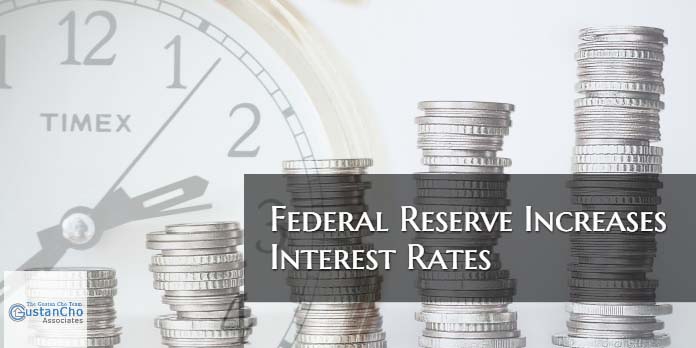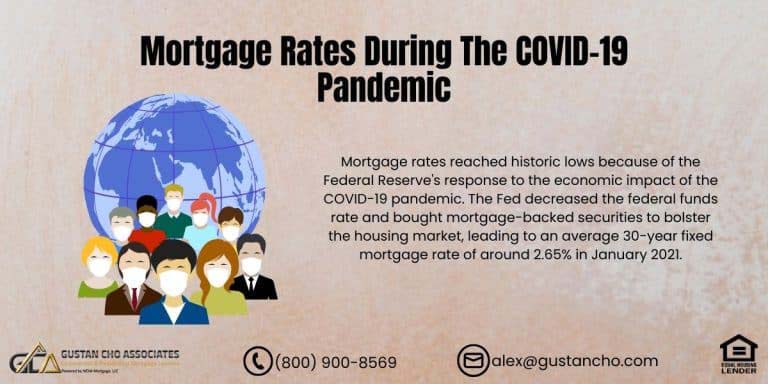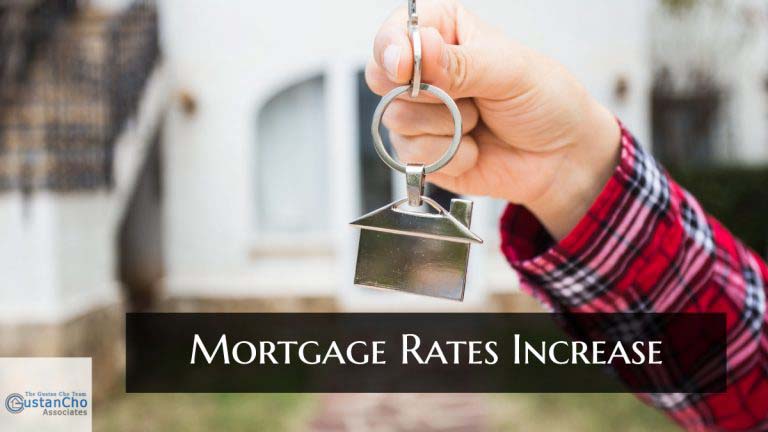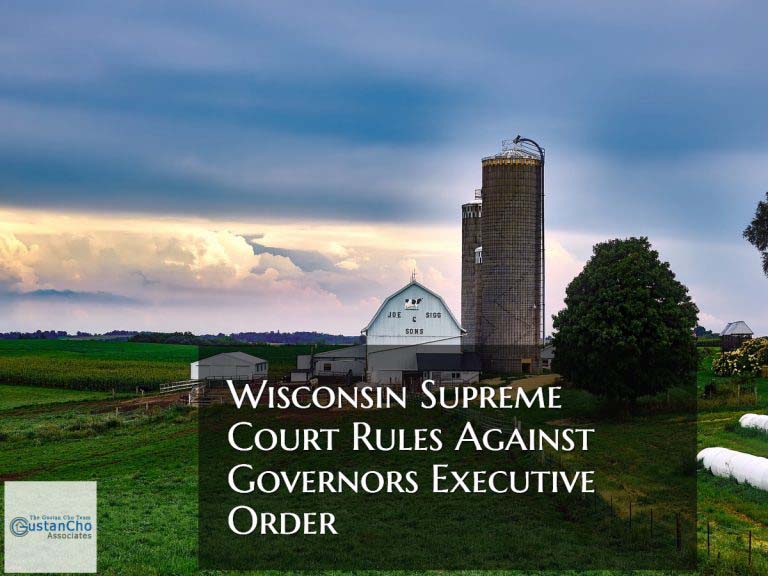This guide covers what happens when the Federal Reserve Board increases interest rates. This guide is an update of an article written about the Federal Reserve Board increasing interest rates by 0.25 basis points, which was published on July 18th, 2018. We will include the previous unedited edition of the original article.
Federal Reserve Board Increases Interest Rates
*(The following content is the archived version of this blog, originally written in July 2018.)*
- As expected, the Federal Reserve Board increased Funds Rates by 0.25% last week.
- (Updated January 24, 2025): The Federal Reserve Board Increases Interest Rate on January 2025 (Updated January 24, 2025).
- Gustan Cho NMLS 873293, Gustan Cho Associates News .
- This week, the Federal Reserve Board increased the Federal Funds Rate by 0.25%, bringing the current funds rate to a range of 5.25% to 5.50%. This is the highest rate since 2001. This decision reflects the Fed’s efforts to mitigate inexorable inflation and economic uncertainty.
Although expected, this interest rate hike arrives when the housing market is already contending with exorbitant mortgage rates, decreased affordability, and regional supply and demand shifts. Below, we will explore the Fed’s recent decision and its repercussions on housing, mortgages, and the wider economy.
The Federal Reserve Interest Rate Decision: The Update of January 2025
Reason for the Increment
As the Fed has indicated, overheating inflation continues to be a challenge for the country and the Fed, which is currently above the 2% target. The prices of services and housing remain stubbornly high, controlling headline inflation.
Chairman Jerome Powell mentioned that further inflation increases could mean another rate increase in 2025. For now, he seems inclined to leave it unchanged.
Start Your Process Towards Buying A Home
Apply Online And Get recommendations From Loan Experts
Effect on Mortgage Rates and Housing Prices
Mortgage rates: *Still High*
- Housing costs vastly increased compared to pre-pandemic stupor, so the average 30-year mortgage pick is 7%.
- Many people are opting to continue renting or postponing their plans to purchase a home due to increased mortgage rates.
Home prices are decreasing in select markets:
- Due to oversaturation in new construction homes, states like California, Florida, and Texas are experiencing these corrections.
- Competitors are lowering rates while introducing upgrades such as better marketing, lowering prices, and offering mortgage rate buydowns to improve their services.
Regional Stagnations
Marketing bayou prices in the coastal regions are not as profitable, thus leaving the rest of the Midwest and Southeast regions relatively unscathed and stable with an influx of migrating home buyers looking to move.
How Higher Rates Impact Americans
Higher Rates Effects on consumer loans include:
Mortgage Payments:
- If you are trying to purchase a home, your monthly bills have increased by 45% since 2022, making it harder for the average consumer to afford a home.
Credit Cards and HELOCs
Alongside the mortgage rate, interest rates on home equity lines of credit (HELOCs) are much more expensive due to the bottom falling out of the Prime Rate.
Small Businesses
Business owners using credit lines to fund their operations have increased expenses, which could slow hiring and investment growth.
Non-QM Loans: A Solution for Today’s Market
Non-QM Loans are a great option for buyers who can’t get around qualifying with traditional non-QM guidelines.
No Waiting Periods
Post-foreclosure, short sale, or bankruptcy. Borrowers can qualify with no waiting period.
Flexible Income Requirements
Ideal for investors or self-employed individuals.
No Private Mortgage Insurance (PMI)
- Non-QM loans eliminate the need for PMI with even lower down payments.
- After additional Fed rate increases, Non-QM loans help buyers purchase while property values are not as high.
What Are The Predictions About The Housing Market Trends In 2025?
Predictions on the Fed’s Future Moves:
The Fed is anticipated to adjust interest rates again this year if inflation does not show signs of subsiding. Some analysts believe these mid-2025 economic slowdown signs could help justify a pause in rate progression.
Correction of Reviews
The rest of the overheated markets are expected to continue their declines, while the other lower-priced regions can grow slowly or even remain stabilized.
Buying Opportunities
Individuals who can afford current rate conditions can purchase the best deals on newly built houses in hyper-supplied states like Texas and Florida.
The last rate hike undertaken by the Federal Reserve highlights its focus on pushing inflation lower. At the same time, its measures create further obstacles for homebuyers and the economy in general. Due to high mortgage rates, a rebalanced housing market is currently being constructed, bringing new challenges and prospects that differ by region and the types of buyers present.
We at Gustan Cho Associates recognize the challenges that today’s market presents. We will surely provide the best mortgage options, such as non-QM loans or traditional ones, without point-of-sale lender overlay conditions.
Also, for the latest news affecting the actions of the Federal Reserve Board regarding locals and housing mortgages, check GCA Forums at www.gcaforums.com and get in touch with other people in the real estate business to overcome today’s dynamic real estate environment.
Archived Blog from July 11, 2018
(Contained herein is this blog’s archival version, originally published in July 2018. The blog discusses the impact of the Federal Reserve Board’s interest rate policies on the market during 2018, which can be found in the link provided.)
Archived Blog: Federal Reserve Board Increases Interest Rates By 0.25% on (July 11, 2018) . The news of the Central Bank increasing Interest Rates came as expected. The mortgage markets had already factored in this change weeks in advance. There were also no significant changes in interest rates, with the news of the Federal Reserve Board advancing its interest rates by 0.25%.
Here is the original blog to the archived version of this blog for your reference.
As expected,the Fed increased the Funds rate by 0.25% last week. The news of the Central Bank increasing interest rates was expected, and the mortgage markets already had this news factored in mortgage rates for the many weeks. There were no major interest rate changes with the news that the Federal Reserve Board increased interest rates by 0.25%. The interest rates were factored in with rumors of the Federal Reserve Board increasing rates last month. In this article, we will discuss and cover how the Fed increases interest rates by 0.25%.
Hot Housing Market Nationwide
Both HUD and the FHFA have increased FHA and Conforming Loan Limits in January 2018 for two years in a row due to rising home prices nationwide. Housing prices have been rising double digits in many parts of the country, especially in California. There are areas in California where home values have doubled since 2009. Many real estate and mortgage experts were expecting a slight correction. There does not seem to be any real estate market correction insight. Many renters are in a rush to qualify for mortgages due to the rising rental prices nationwide. Both government and conforming mortgage guidelines have loosened up to promote homeownership.
Federal Reserve Board Increases Interest Rates: Highest Rates In 10 Years
Mortgage rates are the highest since the 2008 Great Recession and Real Estate Collapse. Mortgage rates have been consistent in the 3% to 4% range until President Donald J. Trump got elected. With the combination of tax cuts and the great economic news during the Trump Administration, home prices have skyrocketed. A great economy is always good, but home prices skyrocketing in such a short period of time can trigger a larger than expected market correction. Dale Elenteny, a senior loan officer of Gustan Cho Associates, says the following about the Federal Reserve Board’s increased rates:
One of the major reasons why the Federal Reserve Board Increases Interest Rates is to cool down the pace of the hot economy. However, there is no sign of a housing market slowdown, even with the highest interest rates in 10 years.
There is still more demand for housing than there is inventory. This is in all states and not limited to a geographical area. The higher interest rates have definitely hurt many mom-and-pop mortgage brokers where their niche is refinancing. Difficult to refinance with higher rates.
How Federal Reserve Board Increases Interest Rates Affect Americans
The Federal Reserve Board increasing interest rates to 1.75% to 2.00% is going to affect mortgages that have impacts on prime rates. This is due to prime rates following Feds Fund interest rates. Consumers who have lines of credit that are attached to Prime rates, such as HELOC/Second Mortgages and/or credit cards, can have their interest rates up by 0.25%. We expect the Federal Reserve Board to increase interest rates again at least several more times this year.
Waiting Period After Housing Event Versus Increasing Home Values and Rates
Real estate values have been increasing double digits in any area in the United States since the Real Estate Market Crash of 2008. There are many qualified homebuyers with prior housing events such as foreclosure, deed in lieu of foreclosure, short sale, and bankruptcy who cannot qualify for government and conventional loans. All government and conforming loans have a mandatory wait period after bankruptcy and foreclosure in order to qualify. Many home buyers have re-established credit, have the down payment, and are paying high rents. They are seeing property values increase and mortgage rates rise before their eyes. The great news is that Gustan Cho Associates Mortgage Group now offers non-QM loans. This frequently asked question section explores the implications of the Federal Reserve Board’s interest rate increase for the mortgage loan borrower and homebuyer sectors in 2025.
Impact of Federal Reserve Rate Changes on Mortgage Borrowers and Real Estate Market
What Happens When The Federal Reserve Increases Interest Rates?
The Federal Reserve increases interest rates to control inflation and stabilize the economy. When the Fed decides to increase its Federal Funds Rate, banks find it more expensive to borrow money from each other. This increase in cost is passed on to consumers in the form of higher rates on loans, mortgages, credit cards, and outros.
In What Way Do Increased Federal Rates Affect the Mortgage Rates?
The rate increases of the Federal Reserve are not felt directly on fixed mortgage rates. However, they do have a major impact on them. Here are ways through which this is done:
Fixed-Rate Mortgages
Rates on 15-year and 30-year fixed-rate mortgages tend to increase during Fed rate hikes.
Adjustable-Rate Mortgages (ARMs)
HELOCs (Home Equity Lines of Credit) and ARMs tend to be more affected since the rate is determined by interest indices such as the Prime Rate, which is a good follower of the Fed Funds Rate.
Refinancing Costs
- The costs associated with renewing mortgages have increased due to increasing rates.
- Higher interest rates result in an overall increase in mortgage payments.
To clarify;
- On a $300,000 loan with an interest rate of 4%, the monthly payment on dues is $1,432.
- However, if the rate increased to 7%, the monthly payment would increase by $500 or more to $1,996.
This change has made it increasingly more difficult to become a homeowner.
Effects On A New Home Buyer
New homeowners are the most impacted group. Put:
- Reduced Affordability: Borrowing funds with additional monthly payments is more expensive, further decreasing the purchasing power.
- Increased Down Payment Requirements: New buyers will have to make larger down payments to reduce monthly expenses.
This means Increased out-of-pocket Spending. More young professionals seeking housing in major cities will likely be priced out.
The effect of higher interest rates will result in lower investment in new homes:
How many homes are sold will completely depend on the demand:
- In Texas, Florida, and other regions with excess supply, home prices are expected to decrease because new builders will need to lower their prices to sell homes.
- In Other Regions, Prices may continue to rise at a slower rate or remain the same since there is a lack of supply to keep pace with contingently high demand.
How does the Fed’s rate hike affect housing market inventory?
An increase in the interest rate usually makes sellers less eager to list homes because:
- “Rate Lock” Effect: Those currently paying lower-rate mortgages may hesitate to sell their home because they will have to switch to a higher-rate mortgage for their next purchase.
- Slowdown in New Construction: Developers spend less on new homes due to increased borrowing costs from high interest rates.
How do federal rate increases impact refinancing?
Refinancing is less appealing due to an increase in rates because:
- Many homeowners have low-rate mortgages, causing them to resist refinancing into rate hikes.
- Once again, high costs make home equity loans and cash-out refinancing less favorable.
What are the effects of HELOCs and adjustable-rate mortgages?
- HELOCs: Interest on HELOCs is usually set based on the Prime Rate, which automatically increases with the liquidity Fed.
- Therefore, borrowers will start paying higher monthly payments right away.
- Adjustable Rate Mortgages: Payments on ARMs with an upcoming rate reset will increase due to higher interest rates, meaning they will have to pay on the newly set interest rates.
How does a federal rate hike affect renters?
Renters are indirectly affected by rate hikes:
- High mortgage rates lead to fewer home purchases, resulting in a high demand for renting properties.
- Higher borrowing costs from landlords can be transferred to tenants, making the rent increasingly expensive.
What Should Homebuyers Do With Higher Interest Rates?
To manage high-interest conditions, here are some strategic options:
- Modify Your Budget: Target homes that fall within your lower borrowing capacity.
- Consider Adjustable-Rate Mortgages (ARMs): If you plan to sell or refinance in the next couple of years, ARMs offer lower initial rates.
- Negotiate Incentives From Builder: Builders in oversupplied markets typically offer rate buydowns, closing cost credits, and other incentives.
- Research Non-QM Loans: Non-QM mortgages are great for the self-employed, investors, or those in unusual circumstances.
- Lock Your Rate: Interest rate locking is a great way to shield yourself from impending rate hikes.
How Do Rate Hikes Impact Real Estate Investors?
Other challenges include:
- Higher Financing Costs: Higher rates mean higher borrowing costs, which will be expensive for investment properties.
- Reduced Cash Flow: Higher mortgage payments also mean lower rental income margins.
- Lower For High-End Rental Demand: There might be lower demand for Luxury rental properties because tenants are pulling back on excess spending.
Are There Any Benefits To Higher Interest Rates?
- Increased Saving Returns: This benefits some, but not all, “savings accounts and certificates of deposit (CDs) offer better returns.”
- Possible Price Drops: In excessively hot markets, buyers will benefit from price drops when they do happen.
- Consistent Inflation: Sustained interest rate increases should bring inflation under control, aiding general economic equilibrium.
What Are Non-QM Loans, and Can It Benefit This Market Segment?
Non-QM loans make it easy for people who do not satisfy standard loan qualifications, granting them more freedom.
- Zero Waiting Time: This option works well for individuals who have experienced recent credit problems, such as bankruptcy or foreclosure.
- Simplified Income Verification: Best suitable for freelancers and anyone with a changing paycheck.
- No Overlays: Non-QM loans are issued without any overlays, which qualify the borrower under the lender’s specific terms.
What Are The Predictions For The Housing Market In 2025?
While the market is expected to stay difficult as rates remain high, buyers, sellers, and investors are not without potential prospects:
- Buyers: Those looking to purchase property will be focused on existing new construction, covering the gaps in supply.
- Sellers: They may have to lower their selling price to meet demand levels.
- Investors Should concentrate on newly developed markets with stable rental demand for the long term.
Severe interest rate increases by the Federal Reserve Board will ripple throughout the market buying, renting, and investing sectors. For the dependent and passive observer, an environment with high interest rates creates a range of obstacles. For the proactive, every challenge is an opportunity; this environment can be navigated. We strive to help buyers in today’s market through customized mortgage solutions, including non-QM loans and no overlay loans. For details, updates, or assistance with complex purchases or refinancing in a high-rate market, visit GCA Forums. Our experts are ready to help.
Qualifying For A Mortgage With A National Lender With No Overlays
Non-QM mortgages are portfolio loans where there is no waiting period after foreclosure, deed in lieu, short sale, or bankruptcy. Home buyers with a prior housing event and/or bankruptcy no longer need to wait until their waiting period has been met. 10% to 20% down payment is required. There is no private mortgage insurance on non-QM loans. Mortgage rates depend on the down payment and the borrower’s credit scores. Home buyers do not have to witness property values increase before their eyes anymore. They now have alternatives to traditional financing. The Federal Reserve Board is expected to increase rates throughout the year and going into next year. Non-QM Loans benefit home buyers to purchase a home now before housing value further increases.
Clarify Your Doubts With Our Loan Officers And Finalize Your Mortgage Loans
Apply Online And Get recommendations From Loan Experts









